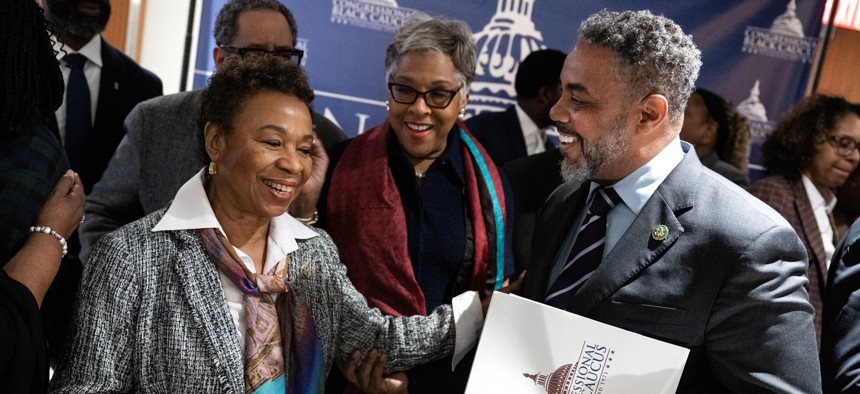Congressional Black Caucus launches AI Policy Series spotlighting discrimination

From right, Reps. Steven Horsford, D-Nev., chairman of the Congressional Black Caucus, Joyce Beatty, D-Ohio, and Barbara Lee, D-Calif., conclude a news conference following the CBC's National Summit on Democracy & Race. The CBC announced Feb. 28 that it would be holding a policy series on AI. Tom Williams/CQ-Roll Call, Inc via Getty Images
The new series of discussions hosted by the House’s Congressional Black Caucus will focus on ensuring AI systems are working for, not against, Black communities.
The Congressional Black Caucus has launched a new Artificial Intelligence Policy Series that will spotlight the potential AI systems have to discriminate against marginalized Black communities in the U.S.
Echoing the broader federal mission to harness the benefits of AI systems while controlling for the problematic possibilities of deploying more generative technologies, CBC members will focus on the specific impact AI systems can have on Black communities and address the potential for AI algorithms to further promulgate bias and discrimination.
“Given the rapid emergence of new AI technologies, we owe it to the communities that we serve to be out front on the trends that will have significant impacts on the lives and the livelihoods of the constituents that we serve,” CBC Chairman Rep. Steven Horsford, D-Nev., said during a briefing on Wednesday.
Horsford confirmed that the series will launch “in the coming weeks” and feature leaders in public policy to focus on bringing equity and inclusion in both access to and the function of AI technologies.
One such focus will center on algorithmic decision=making in the context of economic opportunities for Black Americans, particularly surrounding the discrimination related to housing, health care and financial opportunities.
A goal of the session is to educate CBC members and Congress ahead of passing formal legislation to regulate AI systems.
“We hope that each of the sessions that will be facilitated around this discussion of key aspects of AI and its implications for Black America will inform our legislating here in Washington D.C.,” Rep. Yvette Clarke, D-N.Y., said during the Wednesday briefing. “There's no doubt that we are in need of a federal legislative solution to many of the harms and concerns that impact the lives of Black people in America.”
Beyond Capitol Hill, Horsford added that CBC is aiming for the perspectives voiced in its Artificial Intelligence Policy Series to inform decisions made within federal agencies, as well as the private sector.
“This Congress is closing the racial wealth gap and advancing policies, as well as working with the administration to ensure that racial equity stands at the center of the work that we're doing,” Horsford said. “And whether it's in AI or any other sector, we understand that that we have to have both the opportunity to make sure our communities participate but also ensure that the protections and the guardrails are there to protect any of the challenges or impacts –– negative impacts that we know exist, if they are not addressed in a proactive way from a policy standpoint.”
Sen. Cory Booker, D-N.J., similarly touched on the need for oversight of AI systems in the vein of civil rights and discrimination. Speaking during an Axios discussion, Booker doubled down on the need for scrutiny in algorithmic decision-making and the impact on Black communities.
“With the … transformative impact AI is going to have, we as policy-makers especially should be asking questions about its impact upon a diverse nation,” Booker said on Wednesday. “Will [this] help us to be better in a multicultural democracy? Or will it serve to further exacerbate divisions and disadvantage?”






